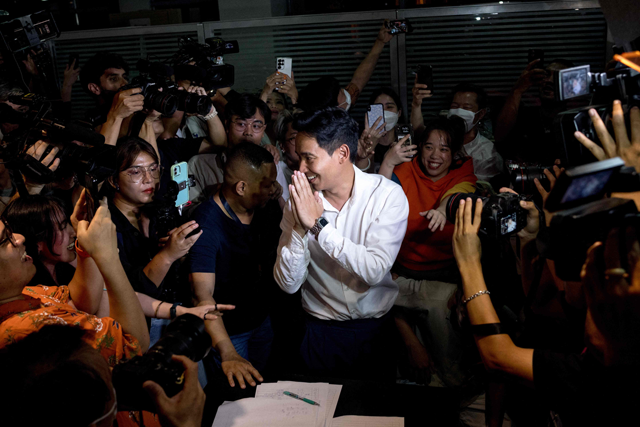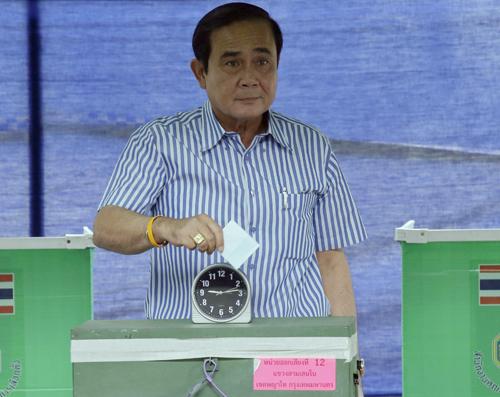You are here
Thai opposition parties dominate early election count
By AFP - May 14,2023 - Last updated at May 14,2023

Move Forward Party leader and prime ministerial candidate Pita Limjaroenrat (centre) leaves the party’s headquarters as votes continue to be counted, during Thailand's general election in Bangkok, on Sunday (AFP photo)
BANGKOK — Thai opposition parties dominated the early vote count in Sunday's national elections, in what was shaping up as a huge rejection of nearly a decade of military-backed government.
The election campaign played out as a clash between a young generation yearning for change and the conservative, royalist establishment embodied by Prime Minister Prayut Chan-O-Cha, the ex-army chief who seized power in a 2014 coup.
With ballots counted from around half of the 95,000 polling stations, the reformist Move Forward Party (MFP) was on nearly five million votes followed by Pheu Thai on 4.2 million.
Prayut's United Thai Nation Party lay third on 1.7 million, though it is not yet clear how the popular vote will translate into parliamentary seats.
And in a kingdom where coups and court orders have often trumped the ballot box, there have been fears the military could seek to cling on, raising the prospect of fresh instability.
Pheu Thai, the party of billionaire former premier Thaksin Shinawatra now fronted by his daughter, Paetongtarn, had urged voters to deliver them a landslide to see off the threat of military interference.
A landslide did not appear to be on the cards and the kingdom looks set for a period of political horse-trading as opposition parties try to form a governing coalition.
The Election Commission is not expected to officially confirm the final number of seats won by each party for several weeks.
But without an overwhelming majority MFP and Pheu Thai face a battle to secure power, thanks to the junta-scripted 2017 constitution.
The new premier will be chosen jointly by the 500 elected MPs and 250 senate members appointed by Prayut's junta — stacking the deck in the army's favour.
In the controversial last election in 2019, Prayut rode senate support to become prime minister at the head of a complex multiparty coalition.
After casting her ballot in Bangkok, Pheu Thai's main candidate Paetongtarn showed no signs of nerves.
"Today is going to be a good day. I have very positive energy about it," the 36-year-old told reporters, smiling broadly.
Protest legacy
The election is the first since major youth-led pro-democracy protests erupted across Bangkok in 2020 with demands to curb the power and spending of Thailand's king — breaching a long-held taboo on questioning the monarchy.
The demonstrations petered out as COVID-19 curbs were imposed and dozens of leaders were arrested, but their energy fuelled growing support for the more radical opposition MFP.
As he arrived to vote in Bangkok, MFP leader Pita Limjaroenrat, 42, said he expected a "historic turnout".
"Younger generations these days care about their rights and they will come out to vote," he told reporters.
While MFP sought support from millennial and Gen Z voters — who make up nearly half the 52 million-strong electorate — Pheu Thai drew on its traditional base in the rural northeast where voters are still grateful for the welfare policies implemented by Thaksin in the early 2000s.
Prayut also urged voters to turn out in large numbers as he cast his ballot on Sunday.
The former general made an unashamedly nationalist pitch to older voters, painting himself as the only candidate capable of saving Thailand from chaos and ruin.
But he lagged badly in the polls, blamed for a sputtering economy and feeble recovery from the pandemic, which battered the kingdom's crucial tourism industry.
Rights groups accuse Prayut of overseeing a major crackdown on basic freedoms, with a huge spike in prosecutions under Thailand's draconian royal defamation laws.
The country has seen a dozen coups in the last century and has been locked over the last two decades in a rolling cycle of street protests, coups and court orders dissolving political parties.
The Shinawatra family's bitter tussle with the royalist-military establishment has been at the heart of the drama, with Thaksin ousted in a 2006 coup and his sister Yingluck unseated by Prayut in 2014.
An unclear or disputed result this time could lead to a fresh round of demonstrations and instability.
Adding to the uncertainty, rumours are already swirling that MFP could be dissolved by court order — the same fate that befell its predecessor Future Forward Party after it performed unexpectedly well at the 2019 poll.
Related Articles
BANGKOK — Former Thai Prime Minister Thaksin Shinawatra arrived back at his Bangkok home from police hospital early Sunday, just six months
BANGKOK — Thailand voted Sunday to approve a junta-scripted constitution, preliminary results showed, in a boost to the army's political asp
BANGKOK — Thailand’s army chief on Tuesday warned against protests after a disputed election, invoking the revered monarchy and castigating


















